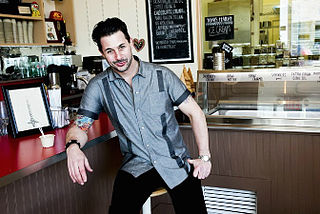A Quote by Samuel Butler
A drunkard would not give money to sober people. He said they would only eat it, and buy clothes and send their children to school with it.
Related Quotes
Money is very difficult to think about. So, we think about money as the opportunity cost of money. So, we at some point went to a Toyota dealership and we asked people, what will you not be able to do in the future if you bought this Toyota? Now, you would expect people to have an answer. But people were kind of shocked by the question. They never thought about it before. So, the most we got was people said, "Well, if I can't buy this Toyota, if I buy this Toyota, I can't buy a Honda." What is this thing? What is this value of price? Very hard to think about it.
Each of us spends money on things that we do not really need. You could take the money you're spending on those unnecessary things and give it to this organization the Against Malaria Foundation which would take the money you had given and use it to buy nets to protect children. And we know reliably that if we provide nets, they're used, and they reduce the number of children dying from malaria. Fortunately more and more people are understanding this idea, and the result is a growing movement effective altruism.
The Captains of Industry have always counseled the rest of us "to be realistic." Let us, therefore, be realistic. Is it realistic to assume that the present economy would be just fine if only it would stop poisoning the air and water, or if only it would stop soil erosion, or if only it would stop degrading watersheds and forest ecosystems, or if only it would stop seducing children, or if only it would stop buying politicians, or if only it would give women and favored minorities an equitable share of the loot?
[ Rajiv Gandhi] was very reflective and rueful and regretful about the fact that his children's education...He wanted them to get educated outside of India, but he said to me the only place that he found where they would be safe was in Russia, and he didn't really want them to be educated there! So, I said, "Well, send them to Australia. I'll look after them." And my security bloke went absolutely bloody bananas, and I said, "We'll look after them." But, in the end, he didn't send them.
When I was a kid, I would come home from school, and my mom would buy the industrial-size Famous Amos cookies or Chips Ahoy when I was lucky. And I would sit in front of the TV set with a glass of milk... and I would dump cookies in there, smash them with my spoon, and eat cookies and milk with a spoon watching 'The Dukes of Hazzard.'
In my opinion, the greatest misconception about the market is the idea that if you buy and hold stocks for long periods of time, you'll always make money. Let me give you some specific examples. Anyone who bought the stock market at any time between the 1896 low and the 1932 low would have lost money. In other words, there's a 36 year period in which a buy-and-hold strategy would have lost money. As a more modern example, anyone who bought the market at any time between the 1962 low and the 1974 low would have lost money.





































